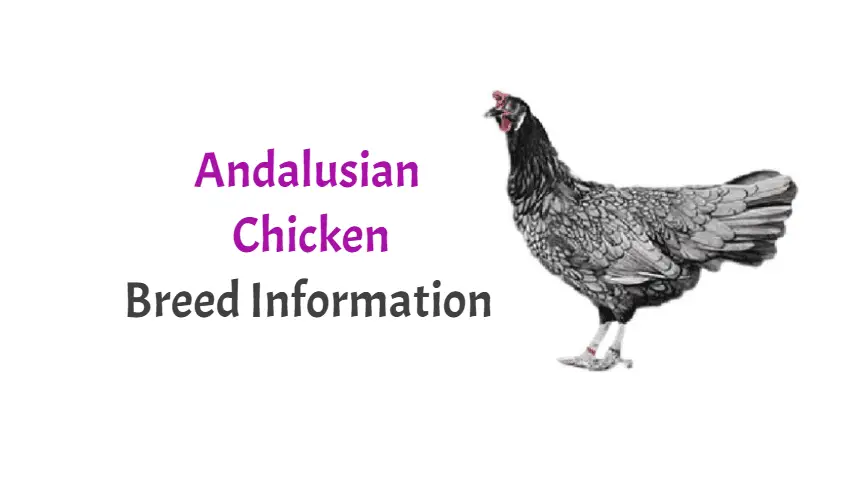Last Updated on January 14, 2025 by Pauline G. Carter
Andalusian Chickens originate from Spain; they are a rugged and ancient breed of chicken. It is assumed that its history is rooted in the Castilian chicken breeds, resembling this Spanish chicken but weighing in a bit lighter. They arrived in England around 1846, being distributed around the Devon and Cornwall areas. This breed of chicken was exhibited for the first time in London at the Baker Street Show, and then later, towards 1855, it was exported to the USA.
Andalusian Chicken | Breed Profile
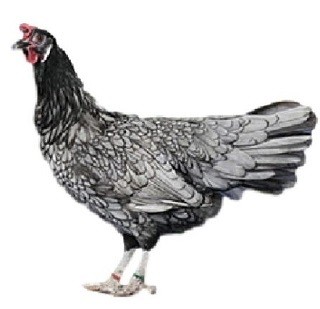
| Country of origin: | Spain |
| Primary use: | Eggs |
| Weight: | Male: Standard: 3.2–3.6 kg, Bantam: 680–790 g Female: Standard: 2.25–2.70 kg, Bantam: 570–680 g |
| Temperament: | Active, Gentle |
| Recognized varieties: | Blue |
| Egg production (annual): | 165 |
| Egg color: | White |
| Egg size: | Large |
| Comb type: | Single |
Origins and History
The Andalusian chicken traces its roots back to the Andalusia region in southern Spain, where it is believed to have been developed through selective breeding practices that date back several centuries. The breed emerged as a distinct variety in the 19th century, characterized by its unique blue feathering, which is a result of a genetic condition called the Andalusian Blue. This genetic trait, a form of incomplete dominance, results in birds that can display a range of blue shades depending on the combination of genes they inherit.
The breed was first introduced to other parts of Europe and the United States in the mid-19th century, where it quickly gained popularity among poultry enthusiasts for its beauty, hardiness, and egg-laying capabilities. Despite its initial popularity, the breed has seen a decline in numbers due to the rise of commercial poultry farming practices that favor more uniformly productive breeds.
Characteristics Of The Andalusian Chicken
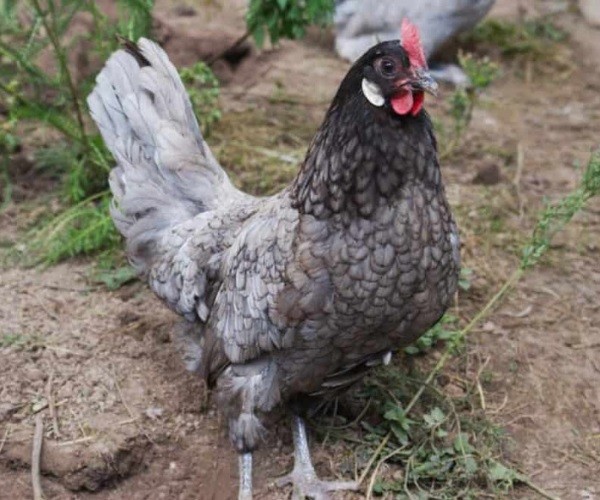
The Andalusian is highly ranked in the productivity category, an ‘eggcellent’ egg layer. It loves to forage and is a hardy bird. Baby chicks become feathered and mature very quickly, with the cockerels showing signs of crowning at 7 weeks old. One of the main distinctions of the Andalusian chicken breed is the blue coloring of the plumage. All feathers should be a clear bluish-slate color, markedly laced with black or dark blue.
Blue Andalusian chickens are produced from crossing black and white birds. They do well in colder climates, although their noticeable crown is prone to frostbite. However, this bird does not stand very well to being confined much, plucking feathers if confined, becoming ‘flighty.’ Andalusians are friendly. They need protection from moisture and wind in the winter months.
They don’t really like to be handled, but they are social creatures, curious, talkative, adventurous, and known to fly over fences. They are not prone to being broody. Cocks weigh in at around 7 lbs., the Hen around 5-½ lbs., the Cockerel 6 lbs. and the Pullets 4½ lbs.
Behavior / Temperament
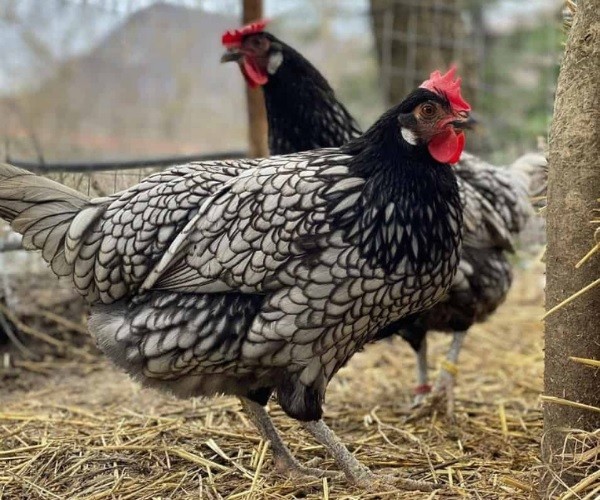
The Andalusian Blue chicken has a stubborn personality and an unbending temperament, which may suit the experienced chicken farmer more. They are very active and thrive on being out and about, foraging. They are very alert. They are noisy, outgoing birds, get bored quickly, and need plenty of diversion. If you handle it correctly, the Andalusian is an outstanding egg layer, out-producing many other chicken breeds.
Conservation and Current Status
The Andalusian chicken is considered a heritage breed, meaning it is of historical significance and is associated with traditional farming practices. In recent years, there has been a growing interest in conserving heritage breeds like the Andalusian chicken due to their genetic diversity, adaptability to local environments, and cultural significance. Various poultry conservation organizations and breed enthusiasts are working to promote the breeding and preservation of Andalusian chickens to ensure their survival and continue their legacy.
Conservation efforts focus on maintaining genetic diversity, promoting sustainable breeding practices, and raising awareness about the breed’s significance. By supporting small-scale farms and backyard poultry enthusiasts in raising Andalusian chickens, these efforts aim to keep the breed viable and relevant in modern agriculture.
Is The Andalusian Chicken A Right Choice For You?
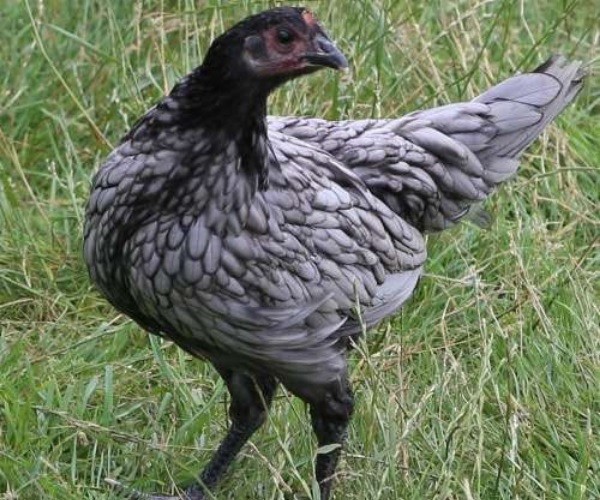
If you have the space for Andalusian chickens, you will love having this excellent egg layer around the place because they enjoy being free; no confinement for this bird – getting anxious and plucking feathers if it can’t be social and out and about, chatting and talking with its friends.
Blue Andalusian chickens for sale are seldom broody birds. In the daytime, they love to go out and roam, and at night time, they will come back to the coop, actually preferring to roost in trees nearby, keeping conversation amongst each other. They need appropriate shelter because they don’t do all that well in freezing weather.
Blue Andalusians are a great choice because they produce so many beautiful porcelain-white delicious eggs, even produced in winter. They are also meat producers. An all-rounder, that’s what the Andalusian Chicken is.
FAQs: Andalusian Chicken
Are Andalusian chickens rare?
Andalusian chickens are considered somewhat rare, especially outside their native Spain. Their unique blue plumage and specific breeding requirements contribute to their rarity. Conservation efforts are in place to preserve their numbers, but they remain less common than many commercial breeds.
Are Andalusian chickens cold-hardy?
Yes, Andalusian chickens are notably cold-hardy. Originating from a region with diverse climates, they have developed a resilience to various weather conditions. Their tight feathering and active nature help them maintain body heat, making them well-suited to cooler climates.
How big do Blue Andalusian chickens get?
Blue Andalusian chickens are medium-sized birds. Roosters typically weigh around 7 to 8 pounds, while hens are slightly lighter, averaging 5 to 6 pounds. Their size, combined with their elegant stature, makes them a distinctive presence in the poultry world.
What color are splash Andalusian chicken eggs?
Splash Andalusian chickens, like their blue counterparts, lay eggs that are white to light brown. The eggshell color is not influenced by the chicken’s plumage, ensuring that the splash variety produces eggs similar in appearance to those of the entire breed.
What are the Pros and Cons of the Andalusian Chicken?
We Liked
- Inquisitive and alert.
- Not aggressive.
- Social and talkative.
- Excellent egg layer.
We Don’t Like
- Don’t fit into cold weather.
- Don’t do well in confinement – need to free-range.
Conclusion
Andalusian Chicken is an excellent breed if you’re looking for a friendly and docile chicken that lays large, delicious brown eggs. Whether you’re an experienced chicken keeper or a newbie, these chickens can be a great addition to your flock. However, it’s important to do your research and ensure that Andalusian Chickens are the right choice for your needs and your flock. So, if you’re interested in learning more about this breed, be sure to do your research online and see what other people are saying. The Andalusian Chicken can be a great addition to any flock with the right care and management!

